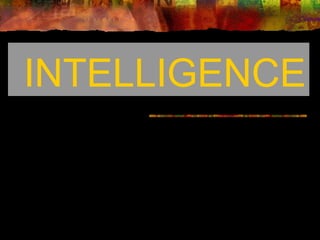
Concept of intelligence
- 1. INTELLIGENCE
- 2. How can we define intelligence? No single agreed upon definition Comprehension, invention, direction, criticism ____ intelligence is contained in these four words (Alfred Binet) The ability to think in terms of abstract ideas. (Terman) The capacity to learn or to profit by experience (Dearborn) The ability to adjust to environment. (Colvin) Intellect put to use. (Woodworth)
- 3. What does intelligence mean? Intelligence is not a thing or object, it is a way of acting in a situation Considerable controversy over its real meaning (13 psychologist in 1921 and 24 in 1986) Both times about half experts mentioned higher level thinking processes as its elements 1986 added metacognition, and the cultural context Both the times psychologists disagreed on its structure
- 4. Is intelligence a one ability or many? Before Spearman there were three theories of intelligence Monoarchic theory Intelligence is one faculty Oligarchic theory A number of big faculties like judgment, memory and imagination Anarchic theory Many abilities independent of each other
- 5. Modern theories Spearman’s (1927) Two Factor Theory General intelligence : use to perform any function He termed it as g In addition each test requires some specific ability He termed this specific ability as s
- 6. Raymond Cattel (1963) and John Horn’s(1998) theory of Fluid and Crystallized Intelligence Fluid intelligence Mental efficiency Culture-free Non-verbal Increases and decreased with age Sensitive to injuries Crystallized Intelligence Ability to apply culturally approved problem-solving methods e.g. vocabulary, facts, skills By applying fluid intelligence in problem solving, we develop crystallized intelligence
- 7. John Caroll (1997) One general ability A few broad abilities Fluid and crystallized abilities Learning and memory Visual and auditory perception Processing speed At least 70 specific abilities Language development Memory span Reaction time
- 8. What do you understand by the concept of Multiple Intelligences? Gardner (1983, 1999) says There are eight separate intelligences Linguistic (Verbal) Musical Spatial Logic-mathematical Bodily-kinesthetic Interpersonal Intra-personal
- 9. Gardner says there may be more; eight is not a magic word He has recently speculated that there may be spiritual and existential intelligences Based his theory on Brain damage affects particular ability An individual may excel in one with no remarkable achievement in others
- 10. Multiple Intelligences and Schools Expands teachers’ thinking about abilities and avenues for teaching No strong evidence that adopting MI approach would increase learning Too broad to tell teachers how to teach E.g. the knowledge that basketball relies on bodily- kinesthetic intelligence tells a coach nothing about the skills his players need to learn.
- 11. Misuses of Multiple Intelligences Trying to teach all concepts or subjects using all intelligences Assuming that it is just enough to apply a certain intelligence, no matter how you use it Using an intelligence as a background for oither activities E.g. listening music while solving math problems
- 12. Mixing intelligence with other desirable qualities Interpersonal intelligence distorted as a license for cooperative learning Intrapersonal intelligence distorted as a rationale for self esteem Direct evaluation or even grading of intelligences without regard to context
- 13. Uses of Multiple Intelligences The cultivation of desired capabilities The personalization of education Understanding individual differences
- 14. Q & A
